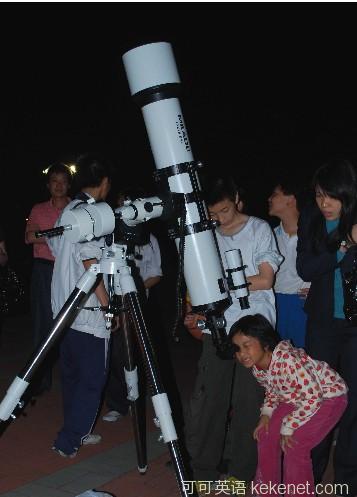
Science and Technolgy
科技
Citizen astronomy
全民天文學(xué)
A new world in your bedroom
臥室里的新天地
Amateur astronomers join the ranks of the planet hunters
業(yè)余天文學(xué)家加入"獵星人"行列
IN AN age of professionals, the ability of amateur scientists to make meaningful contributions has almost vanished.
當(dāng)今世界,專業(yè)人士主導(dǎo)天下,業(yè)余科學(xué)家想要做出積極貢獻(xiàn)卻心有余而力不足。
Almost, but not quite.
不足,絕非完全喪失。
The internet allows professionals to make their data available for analysis by anyone, and some are happy to take advantage of the free labour this promises.
在互聯(lián)網(wǎng)的幫助下,專業(yè)人士們可以向任何人提供數(shù)據(jù)用于研究,其中不乏歡迎這種通過分享數(shù)據(jù)而獲得免費(fèi)勞力辦法的人。
This approach has proved particularly fruitful in astronomy, a science with a long history of amateur contributions.
這種方法被證實(shí)在天文學(xué)領(lǐng)域內(nèi)極富成效。業(yè)余愛好者對天文學(xué)的貢獻(xiàn)有著漫長的歷史。
Armchair astronomers have already helped classify galaxies seen by Hubble, the main orbiting telescope of America's space agency, NASA.
已有沒有嚴(yán)謹(jǐn)研究經(jīng)驗(yàn)的天文學(xué)愛好者幫助將哈勃望遠(yuǎn)鏡觀察到的星系分類。哈勃望遠(yuǎn)鏡是美國宇航局(NASA)主要的軌道望遠(yuǎn)鏡。
They have also looked for interesting asteroids, and kept an eye out for solar storms.
業(yè)余天文學(xué)家們也已參與尋找有趣的小行星和觀測太陽風(fēng)暴。
The latest project to involve them, called Planet Hunters, allows amateurs to search for extrasolar planets-those that orbit stars other than the sun.
最新的"獵星人"計(jì)劃號召業(yè)余愛好者們參與搜尋太陽系外行星——繞除太陽外的其他恒星運(yùn)行的行星。
It was set up by a group at the universities of Oxford and Yale, and links 40,000 participants with data gathered by Kepler, another NASA space telescope that is specifically designed to hunt for planets.
此項(xiàng)目由哈佛大學(xué)和耶魯大學(xué)的一個團(tuán)體發(fā)起,向40000名參與者提供開普勒望遠(yuǎn)鏡獲取的數(shù)據(jù)。開普勒望遠(yuǎn)鏡是NASA的另外一架太空望遠(yuǎn)鏡,專門用于尋找行星。
On September 26th the group announced, in a paper posted to arXiv, an online database, that its participants had discovered two probable exoplanets, one a Jupiter-like gas giant, and the other, possibly, a smaller, rocky world about twice the diameter of Earth.
該組織于9月26日在一篇發(fā)表在 arXiv(一個在線數(shù)據(jù)庫)上的論文里宣布,其成員發(fā)現(xiàn)了兩顆極有可能的外部行星,一顆是與木星類似的氣體巨行星,另外一顆可能是體積較小、直徑約為地球兩倍的巖石星體。
Kepler works by monitoring the thousands of stars in its field of view for tiny changes in brightness.
開普勒望遠(yuǎn)鏡的工作原理是監(jiān)測其視野內(nèi)成千上萬個恒星的亮度的微小變化。
Mostly, these are natural fluctuations, but particularly sharp and regular changes might signify a planet passing in front of a star.
大部分情況下,這些變化都是自然波動,但是一旦有急劇變化或者規(guī)律性變動,可能是行星在恒星前經(jīng)過的標(biāo)志。
The raw data are sent to computers on Earth, converted into graphical form and made available to the Planet Hunters.
原始數(shù)據(jù)將被傳輸?shù)降厍虻挠?jì)算機(jī)上,轉(zhuǎn)化成圖表,向獵星人開發(fā)。
After logging onto the project's website, its users are given a brightness graph from a random star and asked to mark anything of interest.
獵星人在登錄該項(xiàng)目網(wǎng)站后將隨機(jī)獲得一張亮度圖表,可根據(jù)興趣進(jìn)行任何標(biāo)注。
If several people flag the same star, the result is checked against the computer-derived results produced by the main Kepler team.
如果多人標(biāo)注了同一顆恒星,將與專門處理開普勒觀測數(shù)據(jù)的計(jì)算機(jī)結(jié)果比對。
Promising candidates are then checked again by ground-based telescopes.
有可能存在的候選行星將由地面望遠(yuǎn)鏡進(jìn)一步確認(rèn)。
That allows Planet Hunters' participants both to act as a benchmark for the star-detection algorithms and to discover planets the computers have missed, says Chris Lintott, an astronomer at Oxford who helps to run the project.
來自劍橋大學(xué)的天文學(xué)家Chris Lintott說,這樣,獵星人不僅能為恒星探測算法提供檢驗(yàn)標(biāo)準(zhǔn),還能發(fā)現(xiàn)計(jì)算機(jī)漏掉的行星。
What people lack in speed (the computers have already notched up over 1,200 candidate planets since Kepler was launched) they make up for in judgment.
Chris Lintott幫助該項(xiàng)目的運(yùn)行。人們在速度上的劣勢在判斷力上得到彌補(bǔ)(自開普勒望遠(yuǎn)鏡啟動以來,計(jì)算機(jī)已經(jīng)發(fā)現(xiàn)超過1200顆候選行星)。
Some stars being watched have very variable brightness. That is confusing for computers, but for human eyes is less of a problem.
一些觀測中的恒星亮度變化較大,這對于計(jì)算機(jī)來說難以把握,但是對于人眼卻不成問題。
And input from the human planet hunters is used to refine the algorithms, improving their performance.
而且,獵星人輸入的數(shù)據(jù)可以用來校正計(jì)算機(jī)算法,從而優(yōu)化計(jì)算機(jī)性能。
Planet Hunters grew out of Galaxy Zoo, which was set up in 2007 to help researchers classify galaxies spotted by Hubble-just the sort of fuzzy task that machines struggle with but humans excel at.
獵星人計(jì)劃的靈感來源于星系動物園計(jì)劃。星系動物園計(jì)劃成立于2007年,旨在幫助科研人員將哈勃望遠(yuǎn)鏡觀測到的星系分類——正是那種機(jī)器無法勝任而對于人類輕而易舉的麻煩活。
Galaxy Zoo spawned the Zooniverse, a collection of science projects that harness the power of amateurs.
星系動物園計(jì)劃孵化了動物宇宙計(jì)劃——一批借助業(yè)余愛好者力量的科學(xué)計(jì)劃。
Although astronomical projects still dominate, other sciences are starting to adopt the idea.
盡管主要應(yīng)用于天文學(xué)計(jì)劃,其他學(xué)科也開始采用這一想法。
One Zooniverse project aims to reconstruct weather records from old Navy logs; another is helping to transcribe a cache of Egyptian papyri dating from the 1st century AD.
動物宇宙的一個項(xiàng)目計(jì)劃重現(xiàn)古老航海日志里的氣象記錄,另外一個項(xiàng)目計(jì)劃抄錄可追溯到公元1世紀(jì)的埃及紙莎草卷。
Dr Lintott and his colleagues have asked researchers in other fields to submit more ideas, and hope to announce the shortlist in a few weeks' time.
Lintott博士和他的同事們已經(jīng)呼吁其他領(lǐng)域的科研人員們提供更多的想法,有望于幾星期后公布最終入選名單。











